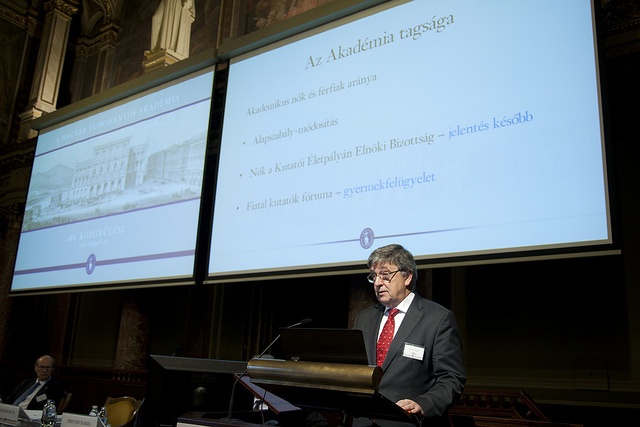President’s report: “The Academy stands united and must remain so”
The report by the Academy’s president, László Lovász, covered issues such as support for female researchers and younger generations, the tasks related to the academy research institute network and international initiatives of a cooperative nature which are of key importance for the MTA.
29 May, 2017
Regarding the tasks of the Academy, besides basic researches, Mr Lovász mentioned applied researches, innovation and knowledge transfer. He also said that in scientific matters the MTA has to act as ‘advisor to the nation.’
“The Academy is a unified organisation which enjoys the highest level of public support in the country and this must remain so,” the president of the MTA said. In his view, an institution of such complexity comprising a public body, a research network and specialists of different sciences may, by its nature, become a source of debate and disagreement. However, these need to be addressed and the best place for this is the Academy itself. Based on his experience, this view is shared by the members of the Academy.
Mr Lovász touched upon the endeavour to increase the ratio of women among academicians, MTA doctors and postdoctoral researchers. To this end, a presidential commission was set up at the beginning of the year, the proposals of which may be decided upon by the 188th General Assembly.
He made mention of the Young Researchers Forum, a new element during this year’s General Assembly, saying he initiated the consultation in the hope that young researchers who are at the dawn of their career and share the same life situations and probably the same difficulties will talk about how they see their prospects, what problems they have and how they believe these can be solved. He expressed hope that the meeting, during which, as a symbolic step, the MTA provided child care for female researchers with small children, would contribute to creating the formal and informal framework of cooperation that could provide everyday support for those at the beginning of their scientific careers.
Mr Lovász also mentioned he did not support the administrative rules concerning the upper age limit for the election of MTA members.
 László Lovász delivering his report at the 188th General Assembly Source: mta.hu/Tamás Szigeti
László Lovász delivering his report at the 188th General Assembly Source: mta.hu/Tamás SzigetiFundamental questions need to be addressed
“The network institution of the Academy is a national treasure,” Mr Lovász said. He emphasised the importance that universities should not consider these as rivals, rather resources. On the two reports regarding the activities of the research institution network between 2010 and 2015, he declared that large-scale constructional changes are followed by consolidation. “Although there is a need for a medium-term concept, this in itself is not sufficient, and a long-term strategy has to be developed in the upcoming twelve months. Fundamental questions need to be answered such as how the ratio of scientific disciplines and new areas should be defined, or how the Academy will be able to react to social problems faster,” he explained. The president also announced that the work of the Strategic Advisory Board would be restructured.
According to Mr Lovász, cooperation between different scientific areas is often not easy, and the same holds true for basic research and applied research. “Institutions of basic research do not only aim at supporting applied researches, but also at educating young people who are able to use state-of-the-art technology and are familiar with science,” the president said.
In discussing the comprehensive, academic, multidisciplinary programs answering the great social questions of the future, the Hungarian Brain Research Program, the Subject Pedagogy Research Program, the National Water Research Program, the Agricultural Program, the Healthcare Program, and the collaborative programs of excellence, he said he also considered them as a kind of experiment, an opportunity where many researchers can work together in a network.
He spoke of the results that had come with the reform of the academic infrastructure and of the further plans, calling the renovation of the MTA headquarters a necessary step. He was happy to announce that the academic cloud had been created as a result of significant IT development.
Mr Lovász highlighted the importance of participation in international science. Last year saw outstanding success with regard to research support won. The European Research Council’s grants of 1.5 to 3 million euros are considered as the benchmark for research excellence all around the world. Twelve scientists from Hungary won ERC support last year. Nine of them received this high-prestige support from an Academy research unit, while six of them were participants in the Lendület (‘Momentum’) program. Mr Lovász emphasised the importance for the Visegrad Four to cooperate on an academy level, as together they could become even more successful in winning research funding.
The president of the Academy also reminded the audience of the fact that this year the World Science Forum, organised together with the world’s most important scientific organisations, will be held in Jordan. For the launch, the MTA is providing considerable support for the Middle Eastern country.
Among last year’s significant results, he mentioned those achieved in the area of popularising science. He believes this purpose is served efficiently by the popular events of the Hungarian Science Festival, the revamped website of the Academy, and the scientific radio show, Szigma, launched last year with the cooperation of the MTA and InfoRádió. Also, they would like the electronic version of the journal Hungarian Science to reach every member of the public body in the near future.
